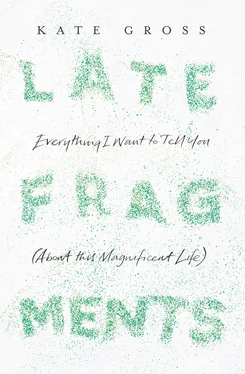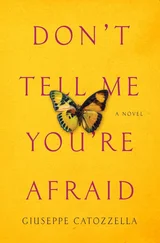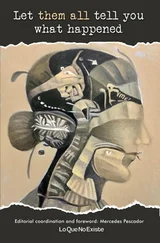It was only when I paused and left London that I vowed to get my health sorted out. We had moved to Cambridge – home of Billy’s technology start-up, which he’d founded the very month he and I went on our first date, in 2004. It was my turn to do the commute to London, but I was avoiding that, and indeed reality in general, by going back to university to do a Masters. Being a student again gave me plenty of time to go and get things checked out. After I had described my symptoms to my GP, she sent me off to hospital, where they put a little camera up my bottom. The nice consultant found nothing to worry about, and told me to eat more fibre to regularise things down there. Little did I know, not being the bottom-health expert I now am, that I had only had a sigmoidoscopy: in layman’s terms, a camera that peeks only partway up your arse, rather than exploring the whole lot. If the camera had poked a bit further round my innards, the consultant probably would have found an adenoma, a pre-cancerous little polyp in my colon. He would have cut it out, I would have been booked in for regular screening, and life would have proceeded to plan. But that didn’t happen. To make matters worse, I always confidently told subsequent doctors I had had a clear colonoscopy, and that everything down there was Just Fine.
In any case, the ensuing years were eventful for other, more pressing reasons. With (I thought) my health problems sorted, I got pregnant in 2008. My twelve-week scan revealed two little swimmers thrashing around in my uterus. Twin boys. Billy and I were petrified. Like cancer, twins didn’t run in the family. What were the chances? One in eighty, apparently, significantly greater than the one in twenty thousand chance of getting colon cancer aged thirty-four. But back to the story. In May 2009 my little swimmers emerged, full-term and healthy. Motherhood took over my body and my mind, as is its way. I was swept along on a wave of oxytocin, and apart from the sleep deprivation felt happier and healthier than I ever had.
Being a mother consumed me, and what energy was left over I applied to work. Halfway through my Masters I had set up the Africa Governance Initiative, working again for our former prime minister Tony Blair. Not only was he the smartest, kindest and most relaxed politician I had ever worked for, he also had a belief in the role of government as a force for good which profoundly appealed to my public-servant heart. He wanted to use what he’d learned in ten long years in power for the benefit of some of the poorest people in the world, by working with the leaders of Africa’s emerging democracies, countries coming out of years of war and mismanagement. As someone who had always seen myself as a bureaucrat with the heart of an explorer, this seemed like a perfect fit. With Tony working alongside presidents and prime ministers, the charity we founded put teams of international staff – capable, passionate, bright young things – into the heart of burgeoning democracies, countries like Liberia, Rwanda and Sierra Leone. There we worked with many incredible African public servants, sitting alongside them in bombed-out, sweltering buildings, with more chickens in the corridors than staff in the offices, assisting with the task of rebuilding a country and shaping a fair, effective and clean government. Between wrangling with twins and being CEO of this new enterprise, I didn’t have much time to worry as my old bottom troubles worsened. Anyway, it was all too easy to blame things on the Rwandan goat brochettes.
Fast forward to October 2012. The kids are three and a bit. I am thirty-four, and something inside just doesn’t feel right. I am very, very tired. On Saturdays I stick the boys in front of the TV while I sleep. I go to the GP. I tell her I’ve had a colonoscopy. She asks when. I say 2007, and she tells me they are valid for five years. Now the problems really begin. I start getting terrible abdominal pains. These reach a peak during an excruciatingly dull interview I’m conducting for a new chief operating officer. Suddenly, it feels as if a giant boulder has rolled across my intestines – a pretty accurate metaphor, it turns out, if you exchange ‘boulder’ for ‘tumour’. But still, life continues. A return trip to the GP, who tells me I probably have a blockage down there, but it’s nothing to worry about. I wonder whether, if my problems had been in a less, well, shitty area (say my armpit) I would have fought harder over the years to sort them out. But I didn’t, and so off I go to California, to running on Laguna Beach, to that accursed United Airlines flight home, and to the CT scan and finally the operating table on 12 October when my tumour and its liverish little friends finally come to light.
I woke up after the operation with Billy next to my hospital bed. It was he who told me, then, that I definitely had cancer. He was reassuring, gentle, a little wild-eyed but surprisingly calm. I was euphoric, full of morphine, and overjoyed to see him. Terrified of my first general anaesthetic, I hadn’t really expected to wake up from the operation. But there I was, on a general surgery ward, midnight on a Friday, with a diagnosis of advanced cancer. And ecstatic to be alive.
God knows what it had been like for Billy to get my phone calls that day: first, telling him I was in hospital. Next, that I’d had a scan and was likely to need surgery. Then, just an hour later, that there was a chance it might be cancer, and that they were operating immediately. He stayed with me right up until I was wheeled into surgery, then walked away. He told me afterwards that while I was under the knife he sat in our little garden smoking and crying. The surgeon had rung him afterwards and confirmed the worst. Then, in the dead of night, Billy came in to be by my side when I woke up. And as I drifted back off into my euphoric, opiated haze he returned home to scour the internet for survival strategies, treatments and miracle cures.
Gentle reader, you may have the misfortune to know all about cancer already. If so, forgive me for what follows. Cancer comes in four easy-to-remember stages. Picture your body as a house – your ‘bone-house’, as it was called by the Anglo-Saxon poets – and cancer as your formerly domesticated dog, now running wild and intent on rampaging through the neighbourhood, destroying all in his path. Stage one is ‘local’ cancer, your dog confined to your kitchen: just the one bodily organ. Here he can make mayhem, but be relatively easily tamed and managed. In stage two, your dog has managed to outgrow the kitchen, and has burst through the wall to colonise the living room, getting his messy hairs and doggy smell everywhere. Taming this beast and removing the traces of him will now be harder. Stage three sees Dog getting all the way to the front door and bounding out (with the front door being the lymph nodes, in this tortured analogy). You can shut the door at this point, but once the blighter has tasted freedom it’s hard to contain his desire to explore the neighbourhood. And so stage four comes. Here, Dog has run amok, taken a giant crap on the pavement, eaten out of the bins and settled into the chippy down the road for a snooze. Your cancer has spread from its initial home to other vital organs. Because of our inability to speak of our rear ends, most colon cancer is detected somewhere between stages two and four, and the chances of cure decline dramatically as the patient progresses through the stages.
But in the hospital that weekend, I don’t yet know any of this. Billy researches the statistics for me. Over time he tells me that while my prognosis is poor, the numbers apply to old people, and since I am so young and healthy I am bound to have a better shot at things. The information on the internet is about five years out of date, and new treatments, surgical techniques and so on have bumped up survival rates. If the tumours in my liver can be operated on, I actually have a chance of a complete recovery – admittedly it’s still only fifty–fifty, if we even get that far. But those odds feel brilliant to us at this stage.
Читать дальше





![Ally Carter - [Gallagher Girls 01] I'd Tell You I Love You But Then I'd Have to Kill You](/books/262179/ally-carter-gallagher-girls-01-i-d-tell-you-i-lo-thumb.webp)






